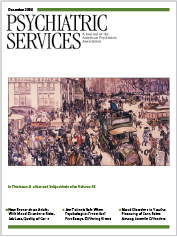A Review of Mood Disorders Among Juvenile Offenders
Abstract
OBJECTIVES: This article provides an overview of what is known about the prevalence, diagnosis, and effective treatment of mood disorders among youths, particularly among juvenile offenders, and discusses the unique problems that arise for the delivery of treatment services. The relationship between mood disorders and disruptive or delinquent behaviors as well as the particular importance of proper diagnosis and treatment of mood disorders in this population are discussed. METHODS: A search was conducted of the MEDLINE and PsycINFO databases for articles that had been published since 1980 on mood disorders in the juvenile offender population as well as articles on adolescent mood disorders. RESULTS: The studies on the prevalence of mood disorders among juvenile offenders varied significantly in the methodology used and in the rates of prevalence found, although all studies showed that this population had high rates of mood disorders. The identification and effective treatment of mood disorders is critical because these disorders are a leading cause of suicide among adolescents and because mood disorders may contribute to or exacerbate delinquent and disruptive behaviors. CONCLUSIONS: Juvenile detainees have a constitutional right to needed mental health treatment. More comprehensive mental health services are required to ensure that juvenile offenders with mental illness are identified and cared for appropriately. Doing so not only will alleviate painful symptoms but may also contribute significantly to improvements in psychosocial functioning, interpersonal relations, and school performance and to decreases in delinquent, disruptive, and suicidal behaviors.



